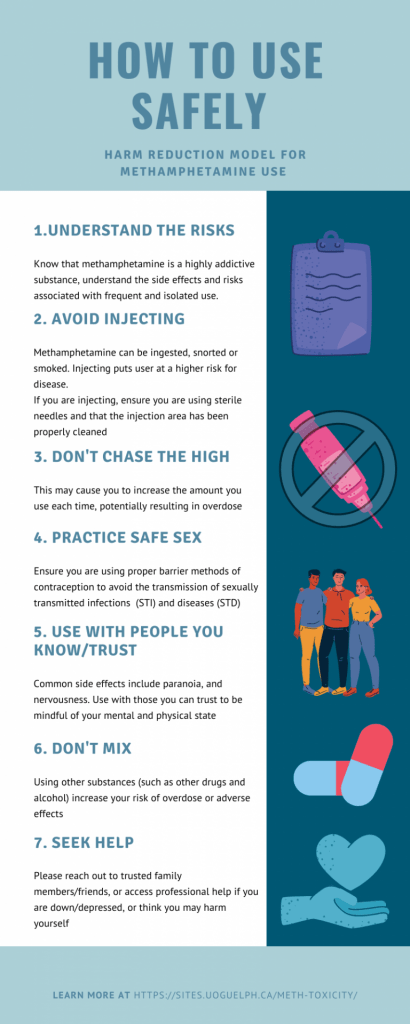Methamphetamine is a highly addictive substance. Tolerance is quick to build with frequent use, meaning that with continual use, users will need more of the drug to achieve the desired effect. When those who are addicted to methamphetamine attempt to stop usage, withdrawal symptoms can occur such as;
- Stomach pain
- Hunger
- Headaches
- Shortness of breath
- Tiredness
- Depression
Harm reduction approach
- Safer ways of using substances
- Recognizing signs of overdose
- Providing clean needles and other injection equipment
- Ensure basic needs (food, shelter, and medical care) are maintained
- Substituting for a safer, more regulated drug option
Because Methamphetamine is highly unregulated in their production they can often contain contaminants, resulting in a large variation in terms of content and purity of the drug. Overdose of methamphetamine can result in:
- Seizures
- High body temperature
- Irregular heartbeat
- Heart attack
- Stroke
- And eventually death
Methamphetamine can be ingested, smoked or injected. Highest risk of overdose occurs when the drug is injected, and the injection route also puts users at serious risk for other infections such as HIV or hepatitis, due to sharing needles.
How to be safer when using methamphetamine
- Understand the risks
- Addiction is no joke, methamphetamine is a highly addictive and dangerous drug. Due to the nature of how its produces there is no consistency in the product you are receiving from suppliers
- Side effects of methamphetamine use:
- Restlessness and anxiety
- Paranoia
- Overheating
- Raising blood pressure
- Seizures or abnormal heartbeat
- When you stop using you feel tired, nervous, hungry, depressed and extremely irritable
- Avoid injecting
- It is the method which poses the mosts risk
- If you are injecting make sure to clean the injection area as well as ensuring that you are using a sterile needle
- Chasing the high
- The highs you experience will not be the same, you may feel that you need to increase the amount you are using each time
- This can lead to overdose or serious side effects/complications
- Practice safe sex
- When high on methamphetamine you are more likely to partake in risky behaviours
- Users are less likely to employ protection during sex or engage in behaviours which may lead to spreading or catching HIV or hepatitis
- Use with people you know and trust
- Methamphetamine use may cause users to be disoriented, paranoid and nervous
- Using with people you trust is important, if things go wrong you want someone there who will be able to call someone and take care of your wellbeing
- Don’t mix
- With drugs or alcohol
- Be particularly mindful of not using with other uppers such as cocaine, amphetamines or ecstasy
- Seek help if you need it
- If you feel down or depressed after using or are having thoughts of suicide, seek assistance if you think you may harm yourself

Information was gathered from:
https://www.drugabuse.gov/publications/drugfacts/methamphetamine
https://www.camh.ca/-/media/files/guides-and-publications/addiction-guide-en.pdf
https://www.camh.ca/en/health-info/guides-and-publications/straight-talk-methamphetamines


